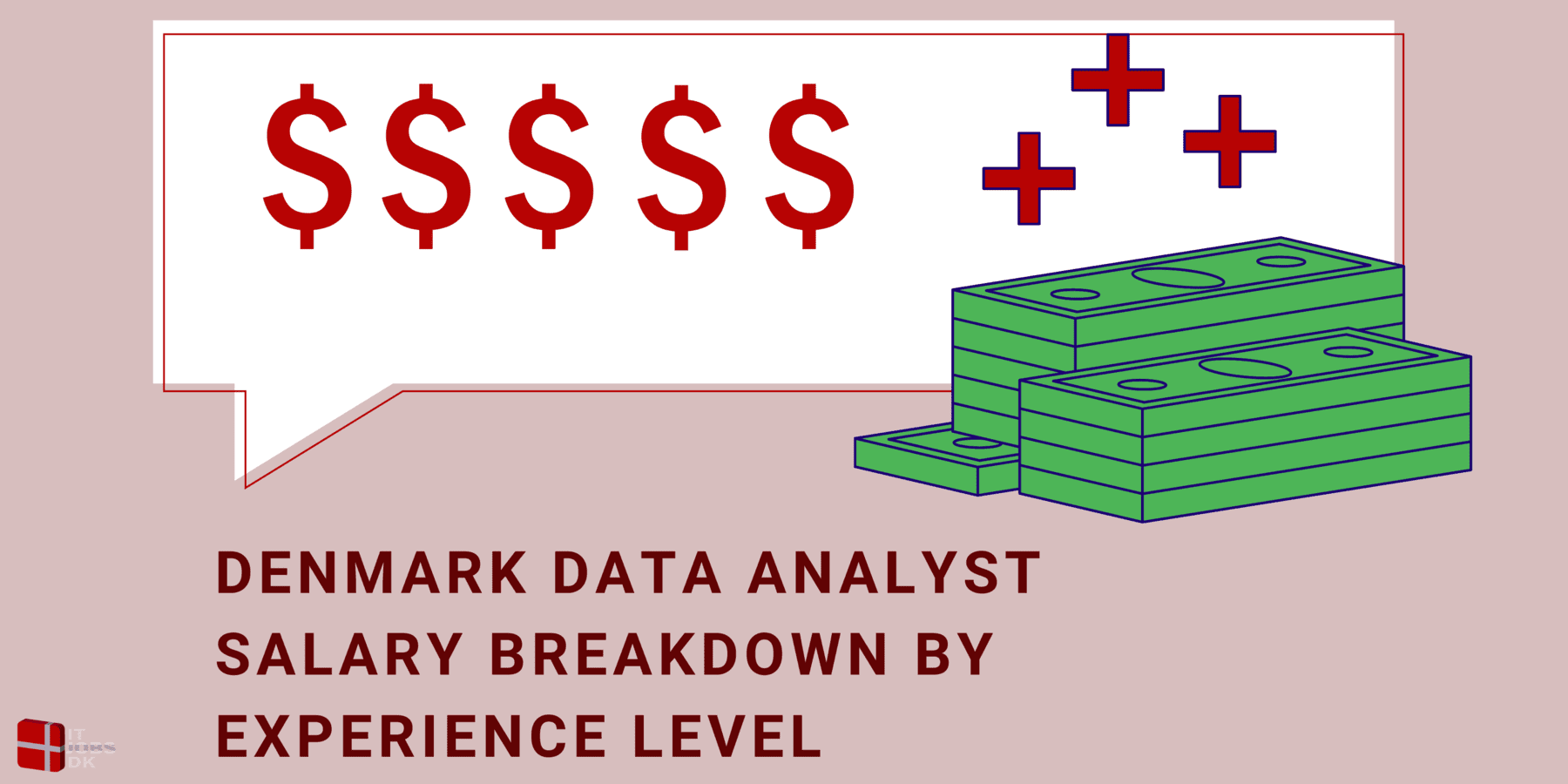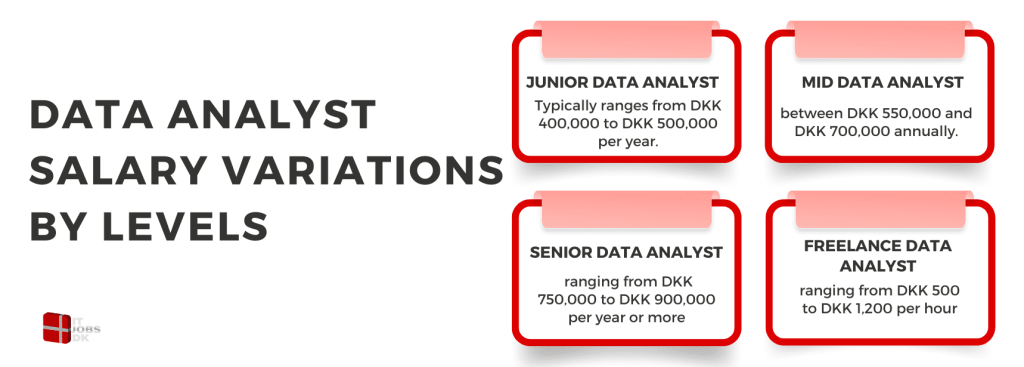
In Denmark’s competitive job market, especially in bustling tech hubs like Copenhagen, understanding salary ranges based on experience is essential for making informed career decisions. For professionals seeking IT jobs Copenhagen, having a clear grasp of how salaries evolve with experience can guide you in setting realistic expectations and negotiating better compensation packages.
Data analyst roles, in particular, have seen significant growth in recent years, driven by Denmark’s emphasis on data-driven decision-making across various industries. Knowing the average data analyst salary in Denmark at different stages of your career—whether entry-level, mid-level, or senior—can help you assess where you stand and what steps you need to take to progress.
Understanding these salary ranges lets you pinpoint the skills and qualifications that can elevate your earning potential. Whether you’re just starting or looking to advance to a senior position, having insight into salary benchmarks empowers you to make strategic decisions about skill development, certification pursuits, and job changes. You can position yourself competitively in Denmark’s thriving data analytics field by aligning your career goals with the evolving salary landscape.
Data Analyst Salary Variations by Levels
Data Analyst salaries in Denmark can vary significantly depending on your experience level, with distinct differences between junior, mid-level, and senior roles. Understanding these variations is crucial for career planning and salary negotiations, whether you’re starting as a junior analyst or considering freelance opportunities.
- Junior Data Analyst Salary: For those just beginning their careers, the data analyst junior salary in Denmark typically ranges from DKK 400,000 to DKK 500,000 per year. Junior analysts are usually responsible for basic data cleaning, report generation, and assisting senior team members with more complex tasks. While these entry-level salaries may seem modest, there is significant potential for rapid growth with the acquisition of specialized skills and certifications.
- Mid-Level Data Analyst Salary: With a few years of experience (3-5 years), mid-level Data Analysts can expect to earn between DKK 550,000 and DKK 700,000 annually. This level usually involves more responsibility, such as handling complex datasets, working on data modeling, and contributing to strategic decision-making. Analysts who excel in tools like Power BI, Tableau, and advanced SQL commands often find themselves in higher salary brackets within this range.
- Senior Data Analyst Salary: Senior Data Analysts, who typically have over five years of experience, command some of the highest salaries in the field, ranging from DKK 750,000 to DKK 900,000 per year or more, depending on the industry and specific skill set. These roles often include leadership responsibilities, such as managing teams, driving data strategy, and leveraging advanced analytics techniques like machine learning and predictive modeling.
Freelance Data Analyst Salary: Freelancing offers an alternative path with flexible work arrangements and the potential for higher earnings based on project scope and client demands. The freelance data analyst salary in Denmark can vary widely, ranging from DKK 500 to DKK 1,200 per hour, depending on expertise and market demand. Freelancers with niche skills or extensive experience can command premium rates, making this an attractive option for those seeking independence and the ability to set their pricing.

Recognizing these salary variations helps data analysts at all levels understand their market value and identify the right opportunities to advance their careers. Whether you’re a junior analyst aiming to climb the corporate ladder or a seasoned professional exploring freelance avenues, aligning your skills with market needs is key to maximizing your earning potential in Denmark’s dynamic data landscape.
Salary Comparison by Industry in Denmark
In Denmark, the payment of a Data Analyst can vary significantly depending on the industry, as each sector values data-driven insights differently. Understanding how the data analyst salary in Denmark compares across various industries can help professionals identify the most lucrative fields and tailor their skills accordingly.
- Finance and Banking: Data Analysts working in the finance and banking sector often command some of the highest salaries, with averages ranging between DKK 600,000 to DKK 800,000 per year. These analysts are tasked with complex responsibilities such as financial modeling, risk assessment, and predictive analytics, which are critical to the industry’s operations. The demand for accurate data insights to drive investment and compliance decisions places a premium on skilled analysts.
- Healthcare and Pharmaceuticals: In the healthcare and pharmaceuticals industry, data analytics is used for everything from patient data management to clinical trial analysis. Data Analyst salaries in this sector typically range from DKK 550,000 to DKK 750,000 per year, reflecting the critical need for data accuracy in medical research and patient care. The specialized nature of the work, often requiring knowledge of specific healthcare data systems, drives salaries toward the upper end of the scale.
- Technology and IT Services: Tech companies and IT service providers heavily rely on Data Analysts to optimize business processes, enhance product development, and support decision-making with actionable insights. The data analyst salary in Denmark within this sector generally falls between DKK 500,000 and DKK 700,000 annually. However, salaries can rise significantly for those who bring specialized skills in machine learning or big data analytics.
- Retail and E-commerce: In retail and e-commerce, Data Analysts focus on customer behavior analysis, inventory management, and sales forecasting. Salaries in this industry range from DKK 500,000 to DKK 650,000 per year. The relatively lower earnings compared to other industries reflects the competitive nature of the sector and its focus on cost management. However, analysts who excel in data-driven marketing and customer analytics often see opportunities for earnings growth.
- Consulting and Professional Services: Data Analysts in consulting firms often work on diverse projects across multiple industries, leading to dynamic and varied roles. Salaries in this sector range widely from DKK 600,000 to DKK 800,000 annually, depending on the firm’s reputation and the complexity of the projects. The consulting environment demands high adaptability and advanced analytics skills, often pushing salaries to the upper end of the scale.
- Comparison with QA Automation Engineer Salary: It’s also valuable to compare Data Analyst salaries with related roles, such as QA Automation Engineers, who earn between DKK 500,000 and DKK 700,000 per year in Denmark. While both positions require technical expertise, QA roles focus more on testing and quality assurance, whereas Data Analysts are centered on extracting insights and driving strategic decisions. Understanding these distinctions can help professionals decide which path aligns better with their career goals and desired compensation.
By comparing salaries across industries, data professionals can make strategic decisions about where to apply their skills and expertise. Whether it’s diving into the high-stakes world of finance or exploring the innovative landscape of tech and IT services, aligning industry knowledge with career aspirations is key to maximizing earning potential in Denmark.
Negotiating Your Salary as a Data Analyst in Denmark
Negotiating your compensation is a crucial step in securing a compensation package that reflects your skills, experience, and market value. Whether you’re just starting or you’re an experienced professional, understanding the Denmark data analyst salary landscape can give you the upper hand in discussions with potential employers. Here are key strategies to help you negotiate effectively:
- Research Industry Standards: Before entering any compensation negotiation, it’s essential to understand the average data analyst salaries in Denmark based on your experience level and industry. Use resources like Glassdoor, Payscale, and Statista to gather data on what companies are paying for your role. This will provide a benchmark and ensure your expectations are aligned with the market.
- Highlight Your Skills and Certifications: Emphasize the specific skills and certifications that set you apart, such as proficiency in advanced analytics tools (Power BI, Tableau), programming languages (Python, R), or data modeling techniques. Certifications like Microsoft Certified: Data Analyst Associate or Google Data Analytics Certification can boost your negotiation position, showing employers you bring additional value to the team.
- Quantify Your Achievements: Use concrete examples of how your work has impacted previous employers. Whether it’s optimizing processes, increasing efficiency, or providing actionable insights that led to business growth, quantifying your achievements can make a compelling case for why you deserve a higher salary.
- Leverage Your Industry Knowledge: Demonstrating knowledge of industry trends can also strengthen your position. For instance, if you know that the finance or tech sectors are currently paying above-average salaries for data analysts, you can leverage this information during negotiations. Highlight your expertise in high-demand areas that are particularly valuable to the prospective employer.
- Consider Perks Beyond Salary: While salary is a key factor, don’t overlook other benefits that can enhance your overall compensation package. This includes bonuses, flexible working arrangements, additional vacation days, and professional development opportunities. In Denmark, employers often offer perks like pension contributions and health insurance, which can be negotiated alongside your salary.
- Be Prepared to Walk Away: If the offer doesn’t meet your expectations and there’s little room for negotiation, be prepared to explore other opportunities. Denmark has a robust job market for data analysts, especially in cities like Copenhagen, Aarhus, and Odense, making it possible to find a role that better aligns with your salary goals.

Understanding the data analyst compensation trends and being strategic about how you present your skills can significantly impact your earning potential. By thoroughly preparing for salary discussions, you can confidently negotiate a package that reflects your value in Denmark’s dynamic and growing data analytics landscape.
Ready to boost your Data Analyst career in Denmark?
Understanding salary trends by experience level, industry, and skillset is key to making strategic career decisions. Whether you’re a junior analyst or a seasoned professional, equip yourself with the knowledge to negotiate your worth, sharpen your skills, and explore the most lucrative opportunities in Denmark’s growing data-driven market.


 Previous Post
Previous Post Next Post
Next Post